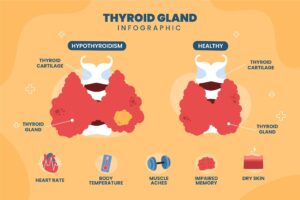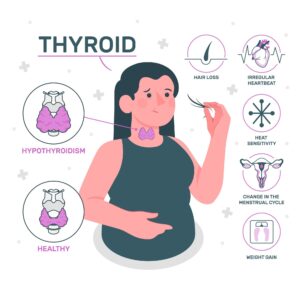Last updated on September 26th, 2024 at 11:15 am
Hypothyroidism treatment typically involves the use of synthetic thyroid hormone medication, such as levothyroxine, to replace the deficient thyroid hormones in the body. This medication helps restore normal thyroid hormone levels, alleviating symptoms and promoting overall well-being. Additionally, lifestyle modifications like dietary changes and stress management can complement medication for optimal management of the condition.
Hypothyroidism, a common thyroid disorder, occurs when the thyroid gland doesn’t produce enough thyroid hormones to meet the body’s needs. These hormones play a vital role in regulating metabolism, energy production, and various bodily functions. When they’re in short supply, a range of symptoms can emerge, affecting overall health and well-being.
Symptoms of Hypothyroidism
The symptoms of hypothyroidism can vary widely in severity and may develop gradually, making them easy to overlook. Some of the common hypothyroidism symptoms are as follows:
- Fatigue
- Weight Gain
- Cold Sensitivity
- Dry Skin and Hair
- Muscle and Joint Pain
- Constipation
- Depression and Mood Changes
- Menstrual Irregularities
- Hoarseness and Swelling in the Neck
- High Cholesterol Levels
- Memory and Concentration Problems

Hypothyroidism Treatment
Fortunately, hypothyroidism treatment is available. The primary treatment goal is to replace the deficient thyroid hormones and restore normal bodily functions. Here are the key treatment of hypothyroidism options:
- Thyroid Hormone Replacement: The most common and effective treatment for hypothyroidism is a medication that provides synthetic thyroid hormones, typically levothyroxine (T4). This medication comes in various brand names such as Synthroid and Levoxyl. It helps replenish the missing thyroid hormones, alleviating symptoms and restoring metabolic balance. Your healthcare provider will prescribe the appropriate dosage based on your specific needs.
- Regular Monitoring: After starting thyroid hormone replacement therapy, it’s essential to undergo regular blood tests to check thyroid hormone levels. Adjustments to medication dosage may be necessary to ensure that hormone levels remain within the normal range. Typically, once the right dosage is established, these tests are done less frequently.
- Lifestyle Modifications: Alongside medication, lifestyle changes can enhance the effectiveness of treatment and improve overall well-being. These changes include maintaining a well-balanced diet, incorporating regular physical activity, managing stress, and avoiding excessive consumption of goitrogenic foods, which can interfere with thyroid function.
Read: What are Generic Medicines?
Hypothyroidism Natural Treatment
Hypothyroidism, characterized by an underactive thyroid gland that produces insufficient thyroid hormones, is a condition that affects millions of people worldwide. While conventional medication, typically synthetic thyroid hormone replacement, is the standard treatment, some individuals seek complementary and natural approaches to manage their hypothyroidism.
Hypothyroidism is important to note that these natural treatments should not replace medical advice or prescribed medications but can be used as supportive measures to promote overall well-being. In this article, we’ll delve into some of the natural treatments and lifestyle adjustments that may complement conventional hypothyroidism management.

Hypothyroidism Treatment Diet
The diet for the treatment of hypothyroidism is mentioned below:
- Iodine: Iodine is a crucial component of thyroid hormones, and inadequate intake can contribute to thyroid dysfunction. However, most individuals in developed countries have sufficient iodine intake through their diets. Excessive iodine intake can also be detrimental, so it’s essential to strike a balance.
- Selenium: Selenium is another mineral essential for thyroid health. It helps convert inactive thyroid hormone (T4) into the active form (T3). Foods rich in selenium include Brazil nuts, sunflower seeds, and seafood.
- Antioxidant-Rich Foods: Including plenty of fruits and vegetables in your diet can provide antioxidants that may help reduce inflammation and support overall health.
- Gluten and Dairy: Some individuals with hypothyroidism report feeling better when they reduce or eliminate gluten and dairy from their diets. This may be due to improved gut health and reduced inflammation.
> Consult a doctor and Order Medicine Online
Home Remedies for Hypothyroidism
The primary home remedies for curing hypothyroidism are listed below:
Stress Management: Chronic stress can negatively affect thyroid function. Implementing stress reduction techniques such as mindfulness, meditation, yoga, or deep breathing exercises can be beneficial. A calm and stress-free lifestyle can support overall health and well-being.
Exercise: Regular physical activity can help boost metabolism and improve mood, both of which can benefit individuals with hypothyroidism. Consult with your healthcare provider to create a safe and appropriate exercise plan tailored to your needs and fitness level.
Supplements: While it’s important to consult with a healthcare professional before taking any supplements, some natural supplements may support thyroid health. These include:
- Ashwagandha
- Bladderwrack
- L-tyrosine
Mindful Eating and Portion Control
For those who struggle with weight gain due to hypothyroidism, adopting mindful eating habits and portion control can help manage weight.
Goitrogenic Foods: Certain foods, often referred to as goitrogens, have the potential to disrupt thyroid function if consumed in significant quantities. These encompass cruciferous veggies such as broccoli, cabbage, and kale. While they are healthy foods, it’s essential to consume them in moderation, especially when raw.
Conclusion:
Hypothyroidism treatment is available along with proper lifestyle adjustments. If you suspect you have hypothyroidism or are experiencing symptoms, don’t hesitate to consult a healthcare professional for a thorough evaluation. With the right hypothyroidism treatment and ongoing care, individuals with hypothyroidism can regain their vitality and lead healthy, fulfilling lives. Remember that treatment is personalized, and regular communication with your healthcare provider is essential to achieving optimal thyroid function and well-being.
How to find substitute Generic Medicine?
To find substitute generic medicine, consult your healthcare provider or pharmacist. They can recommend affordable generic alternatives to brand-name medications. Generic drugs contain the same active ingredients and are equally effective but usually cost less.
You can also check online resources and ask your healthcare provider if they offer samples or patient assistance programs to help reduce medication costs further. Always consult a healthcare professional before making any changes to your prescribed medications.
FAQs on Hypothyroidism Treatment
Q:1 What is hypothyroidism treatment?
Hypothyroidism treatment involves the use of synthetic thyroid hormone replacement medication, such as levothyroxine, to restore normal thyroid hormone levels in the body. This medication is typically taken daily and requires regular monitoring to adjust dosage as needed. Lifestyle modifications, including a balanced diet and stress management, can support treatment effectiveness.
Q:2 Can hypothyroidism be cured with treatment?
Hypothyroidism is typically managed rather than cured. Treatment involves lifelong medication to replace missing thyroid hormones.
Q:3 Are there natural remedies that can replace medication for hypothyroidism?
While natural approaches like dietary changes and stress management can complement treatment, they are not a substitute for thyroid hormone replacement medication prescribed by a healthcare provider.
Related Links:
